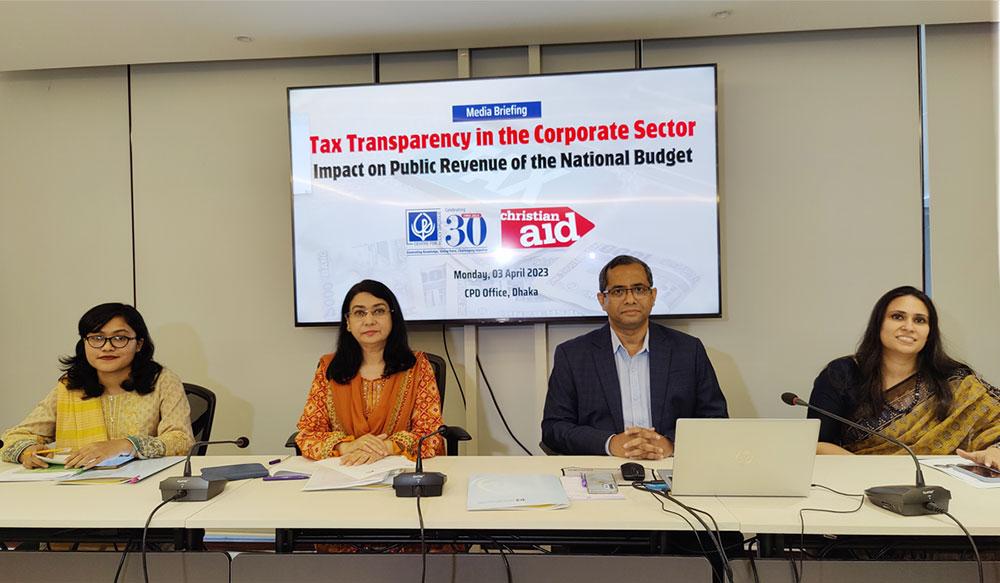
Public revenue could be substantially increased if government takes appropriate measures against tax evasion and tax avoidance. The amount could be as low as BDT 55,800 crore to as high as BDT 292,500 crore. Because of lack of tax transparency, government is losing a huge amount of taxes. Such a huge amount of tax loss reduces government’s scope to invest in the important social sector related activities. This has been revealed at a media briefing organised by Centre for Policy Dialogue (CPD) on Monday, 3 April 2023.
CPD in partnership with Christian Aid jointly conducted a study titled “Tax Transparency in the Corporate Sector: Impact on Public Revenue of the National Budget”. The study has been conducted by Dr Khondaker Golam Moazzem, Research Director of CPD; Dr Shah Md Ahsan Habib, Visiting Research Fellow, CPD, and Professor, Selection Grade, Bangladesh Institute of Bank Management (BIBM); and Chowdhury Fariha, Programme Associate, CPD.
Dr Fahmida Khatun, Executive Director, CPD, chaired the session and said “Tax transparency can ultimately contribute to minimising fiscal deficit and ensure sustainable growth of the country”.
In his keynote presentation, Dr Khondaker Golam Moazzem, said “The amount of tax evasion is estimated to be 8 times of social safety net and welfare expenditure”. Tax evasion broadens the circle of poverty and erodes the economy of developing countries. He highlighted that tax avoidance and evasion occurs in multiple ways – reserve and provision, showing less income, unethical support from tax practitioners, showing more investment allowances, individual intention to show less income, and high informal transaction or cash-based transactions.
Dr Moazzem highlighted the recommendations of the study and said that Bangladesh needs to work intensively to improve the tax net. There must be a declared specific period of tax exemptions or incentives with purpose and mechanism to assess the effectiveness of exemptions. Cashless transaction should be promoted and digitalisation should take place under the integrated financial transaction system. Cashless transactions are more transparent and cannot be hidden from tax authority, and digitalisation will also improve the efficiency of tax administrators.
He added that Bangladesh needs to start practicing mandatory sustainability reporting for greater disclosure and transparency. Disclosure of information regarding tax evasion and associated penalties might prove to be an important incentive. Bangladesh needs to assign immediate attention to improve in terms of secrecy index such as avoiding promoting tax evasion and using legal entity identifier. The government should be concentrating on reforming the tax structure and this will help to achieve their targeted goal of 17 per cent tax-GDP ratio by 2030 and to achieve the targeted goal of is 9.5 per cent by FY2025-26 as mentioned by International Monetary Fund (IMF).
In the recommendations for national budget of FY2023-24, Dr Moazzem underscored that the finance minister should announce specific budgetary measures in order to reduce tax avoidance and tax evasion and thereby improve tax transparency in the country. An annual target of reducing the tax avoidance through gradual phase out of tax incentives, tax breaks and other concessions for established sectors can be set. Tax exemptions should also be withdrawn from various sectors to boost revenue. Strategies for formalisation of all types of economic transactions through digitalisation of the transaction system should be set. Initiatives for establishing an integrated financial transaction system needs to be taken. The national budget should withdraw all kinds on non-transparent tax related provision including provision for whitening black money which contradicts tax transparency efforts.
The media briefing was also attended by Ms Nuzhat Jabin, Programme Manager – Economic Justice, Christian Aid Bangladesh, who shared her valuable insights.
The media briefing was followed by a Q&A session with journalists. The programme was live streamed on CPD’s social media.

